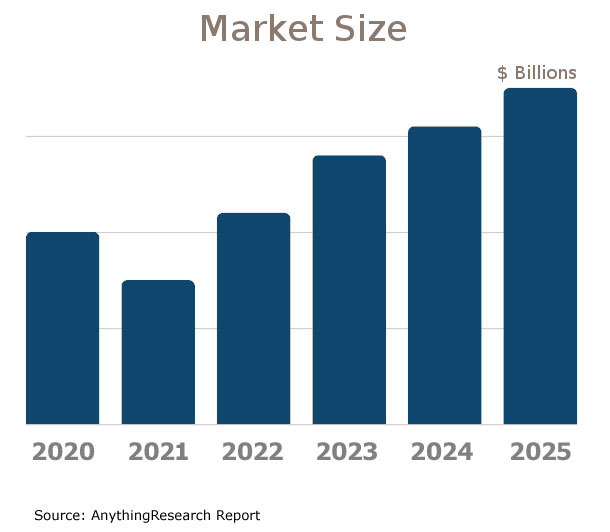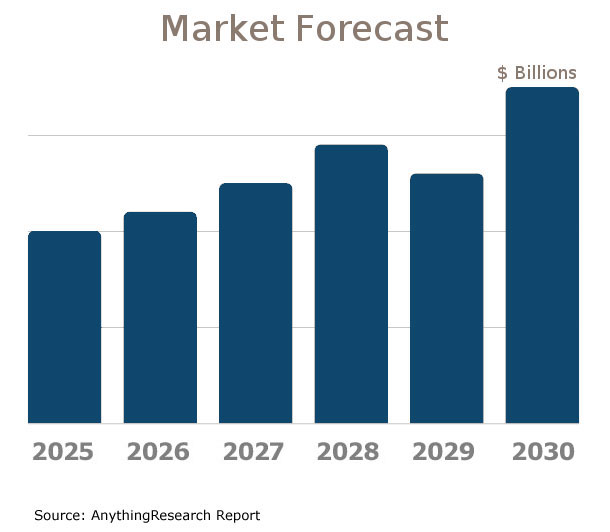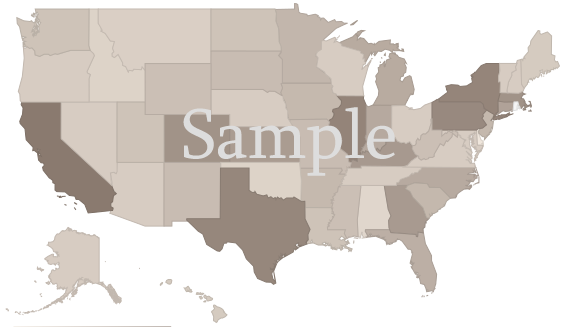| Standard Report | Premium Report | |
|---|---|---|
| Current State of the Industry |  |
 |
| Market Size (industry trends) |  |
 |
| Market Forecast (5-year projection) |  |
|
| Products/Services Breakdown |  |
|
| Revenue per State |  |
 |
| Financial Metrics |  |
 |
| Salary & Compensation Statistics |  |
 |
| Public Company Information |  |
 |
| Key Private Companies |  |
|
| Government Vendors |  |
|
| Instant Download - Available immediately upon purchase |  |
 |
Download both PDF and Excel


|
 |
 |
| Download now: |


2026 U.S. Industry Statistics & Market Forecast - Handbag, Purse, and Leather Product Manufacturing
Market Size & Industry Statistics
The total U.S. industry market size for Handbag, Purse, and Leather Product Manufacturing:
Industry statistics cover all companies in the United States, both public and private, ranging in size from small businesses to market leaders.
In addition to revenue, the industry market analysis shows information on employees, companies, and average firm size.
Investors, banks, and business executives use growth rates and industry trends to understand the market outlook and opportunity.

| Statistics | 2020 2021 2022 2023 2024 2025 | |
|---|---|---|
| Market Size (Total Sales/Revenue) |
Order at top of page | |
| Total Firms | ||
| Total Employees | ||
| Average Revenue Per Firm | ||
| Average Employees Per Firm | ||
| Average Revenue Per Employee | ||
Market Forecast
Market forecasts show the long term industry outlook and future growth trends. The following extended five-year forecast projects both short-term and long-term trends.

| Forecast / Industry Outlook | 2025 | 2026 | 2027 | 2028 | 2029 | 2030 |
|---|---|---|---|---|---|---|
| Market Forecast ($ millions) | ||||||
| Projected Industry Growth Rate (%) | ||||||
U.S. Geographic Distribution: Revenue Statistics by State
Market Size by State ($ millions) indicates how the industry's competition is distributed throughout the country. State-level information can identify areas with higher and lower industry market share than average.
Income Statement (Average Financial Metrics)
Financial metrics provide a snapshot view of a benchmark "average" company. Key business metrics show revenue and operating costs. The data collected covers both public and private companies.| Industry Average | Percent of Sales (Industry Benchmark) |
|
|---|---|---|
| Total Revenue | Order at top of page |
|
| Operating Revenue | ||
| Cost of Goods Sold | ||
| Gross Profit | ||
Operating Expenses | ||
| Pension, profit sharing plans, stock, annuity | ||
| Repairs | ||
| Rent paid on business property | ||
| Charitable Contributions | ||
| Depletion | ||
| Domestic production activities deduction | ||
| Advertising | ||
| Compensation of officers | ||
| Salaries and wages | ||
| Employee benefit programs | ||
| Taxes and Licenses | ||
| Bad Debts | ||
| Depreciation | ||
| Amortization | ||
| Other Operating Expenses | ||
| Total Operating Expenses | ||
| Operating Income | ||
| Non-Operating Income | ||
| EBIT (Earnings Before Interest and Taxes) | ||
| Interest Expense | ||
| Earnings Before Taxes | ||
| Income Tax | ||
| Net Profit Net Income | ||
Financial Ratio Analysis
Financial ratio information can be used to benchmark how a Handbag, Purse, and Leather Product Manufacturing company compares to its peers. Accounting statistics are calculated from the industry-average for income statements and balance sheets.| Profitability & Valuation Ratios | Industry Average |
|---|---|
| Company valuation can be measured based on the firm's own performance, as well as in comparison against its industry competitors. These metrics show how the average company in the Handbag, Purse, and Leather Product Manufacturing industry is performing. | |
| Profit Margin Gross Profit Margin, Operating Profit Margin, and Net Profit Margin. Show company earnings relative to revenues. |
|
| Return on Equity (ROE) Return on Equity (ROE) is net income as a percentage of shareholders' equity. Shareholders' Equity is defined as the company's total assets minus total liabilities. ROE shows how much profits a company generates with the money shareholders invested (or with retained earnings). |
|
| Return on Assets (ROA) Return on Assets (ROA) is net income relative to total assets. The market research on Handbag, Purse, and Leather Product Manufacturing measures how efficiently the company leverages its assets to generate profit. ROA is calculated as Net Income divided by Total Assets. |
|
| Liquidity Ratios | Industry Average |
|---|---|
| Bankers and suppliers use liquidity to determine creditworthiness and identify potential threats to a company's financial viability. | |
| Current Ratio Measures a firm's ability to pay its debts over the next 12 months. |
|
| Quick Ratio (Acid Test) Calculates liquid assets relative to liabilities, excluding inventories. |
|
| Efficiency Ratios - Key Performance Indicators | Industry Average |
|---|---|
| Measure how quickly products and services sell, and effectively collections policies are implemented. | |
| Receivables Turnover Ratio If this number is low in your business when compared to the industry average in the research report, it may mean your payment terms are too lenient or that you are not doing a good enough job on collections. |
|
| Average Collection Period Based on the Receivables Turnover, this estimates the collection period in days. Calculated as 365 divided by the Receivables Turnover |
|
| Inventory Turnover A low turnover rate may point to overstocking, obsolescence, or deficiencies in the product line or marketing effort. |
|
| Fixed-Asset Turnover Generally, higher is better, since it indicates the business has less money tied up in fixed assets for each dollar of sales revenue. |
|
Compensation & Salary Surveys for Employees
Compensation statistics provides an accurate assessment of industry-specific jobs and national salary averages. This information can be used to identify which positions are most common, and high, low, and average annual wages.| Title | Percent of Workforce | Bottom Quartile | Average (Median) Salary | Upper Quartile |
|---|---|---|---|---|
| Management Occupations | 7% | Order at top of page |
||
| General and Operations Managers | % | |||
| Office and Administrative Support Occupations | 12% | |||
| Material Recording, Scheduling, Dispatching, and Distributing Workers | 5% | |||
| Production Occupations | 64% | |||
| Assemblers and Fabricators | 11% | |||
| Miscellaneous Assemblers and Fabricators | 11% | |||
| Textile, Apparel, and Furnishings Workers | 44% | |||
| Sewing Machine Operators | 18% | |||
| Sewing Machine Operators | 18% | |||
| Shoe and Leather Workers | 24% | |||
| Shoe and Leather Workers and Repairers | 24% | |||
Handbag, Purse, and Leather Product Manufacturing Competitor Landscape & Key Companies [PREMIUM]
The most influential companies in the Handbag, Purse, and Leather Product Manufacturing industry and adjacent industries either have large market share or are developing new business models and methods that could disrupt the status quo. We look at leading and emerging companies in the Handbag, Purse, and Leather Product Manufacturing industry and adjacent sectors:| Market Leaders: Direct Competitors Companies with the largest market share, focused in this industry |
Market leaders: Diversified Competitors Largest companies that have diversified operations in this and other industries |
| Innovators: Direct Competitors Innovative, Emerging, and Disruptive Companies that may influence the future direction of the industry. |
Innovators: Diversified Competitors Innovators and Disruptors in adjacent industries that may also affect the Handbag, Purse, and Leather Product Manufacturing industry. |
Source:
Latest Industry News
- Unpacking the True Meaning of "Made in China" in Today's Market - A "Made in China" label doesn't necessarily mean that every component came from that country. Here's how authorities determine a product's "country of origin." (07/06/2025)
- When design speaks louder than logos - Ahikoza by Brahm, an Indian brand, gains attention after Lauren Sanchez carries its clutch. The brand focuses on subtle designs and craftsmanship. Namrata Karad founded Ahikoza nine years ago. Other Indian labels like 11. (07/05/2025)
- Quilt to Last: How MZ Wallace’s Statement Bag Became a $100 Million Business - Monica Zwirner and Lucy Wallace Eustice have used timeless product design to build an accessories business with staying power. (07/02/2025)
- Unlocking MSEs potential in leather sector - Policy support to strengthen hides and skins aggregation centres is essential. This will strengthen the value chain by enhancing competition and price discovery. The roll-out of the (06/30/2025)
- Want to shop luxury? Jewellery may be a safer bet than handbags - The luxury industry’s focus on ultra-wealthy customers has led it to overlook the importance of middle-class buyers, who despite an inconsistent market remain c (06/30/2025)
- Luggage bags for women: Top 8 picks curated for women to help them travel in style - These best luggage bags for women that combine smart design with style. Each luggage bag helps you travel with ease while keeping everything neatly organised. (06/29/2025)
- Herf Apparel Announces Sleek All-Black Leather Cigar Case in Major Product Expansion - Herf Apparel announces the launch of an all-black leather edition of its signature Herf Crossbody 2.0 cigar case, driven by customer demand and built for true cigar enthusiasts.Odenville, Alabama, June 27, (06/27/2025)
- Handbag Market Size To Surpass USD 123.56 Billion By 2032, Grow At A CAGR Of 6.82 % To Forecast 2025-2032 - Handbag Market Handbag Market was valued at USD 72.89 billion in 2024. The Global Handbag Market size is estimated to grow at a CAGR of 6.8 (06/26/2025)
- Tariffs are challenging the cachet of luxury goods from Europe - The trade war has turned a spotlight on the artisanal clusters behind glamorous goods, inviting fresh scrutiny of one of the industry’s key selling points. (05/25/2025)
- From Diaper Bags to Luxury Leather: Femi Olayebi’s inspiring story - Femi Olayebi stands as the visionary force behind the prestigious FemiHandbags brand. With over three decades of expertise in (05/24/2025)


Related Reports
Can't find what you're looking for? We have over a thousand
market research reports.
Ask us and an analyst will help you find what you need.


